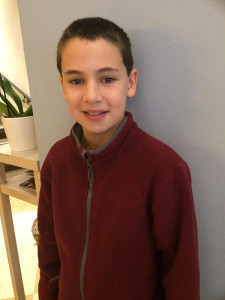 For many 13-year-old Jewish boys in America, the Bar Mitzvah is a weighty coming of age ceremony that they have long expected and prepared for. They know that however young they feel, a Bar Mitzvah (or Bat Mitzvah, for girls) is meant to prove they can now be recognized as an adult who must follow the Jewish commandments and can fully take part in religious practice.
For many 13-year-old Jewish boys in America, the Bar Mitzvah is a weighty coming of age ceremony that they have long expected and prepared for. They know that however young they feel, a Bar Mitzvah (or Bat Mitzvah, for girls) is meant to prove they can now be recognized as an adult who must follow the Jewish commandments and can fully take part in religious practice.
Preparing for the ceremony requires hard, nerve-wracking work. They will have to prove themselves in front of friends, family, and their congregation, and they will have to spend hours studying religious scriptures in a very different language (Hebrew). Many hours.
But Aaron Berger isn’t like most boys. He also saw his Bar Mitzvah as an opportunity – to express his principles and beliefs in a way that would do good for others beside him.
Monetary gifts to a Bar Mitzvah boy after the ceremony are commonplace. After making one purchase for himself, Aaron put half of the money in his college fund. He decided he would give the rest to a local organization that was taking action to end poverty and hunger and would “put it to good use.”
Having participated in some of our events and after researching us online, he chose Just Harvest.
Aaron thinks he may have learned the value of kids taking part in philanthropy and the innovative power of nonprofits to address societal problems by something (amazing!) he saw in his childhood. “My friend was raising money to pay for these soccer balls that were being sent to poor neighborhoods in different countries. After playing with them they produce energy so you can go home and plug them into a lightbulb.” The balls were sent to people without reliable access to electricity. “So these soccer balls were not only a source of fun for the kids but when they get back at night they can have a source of light.”
“He’s probably the most empathetic of my kids,” says his mother Rachel. “I think he’s just naturally always been that way. When he was little and we would pass a homeless person on the street he would say `Mom, let’s go get them a sandwich.’ That’s the kind of kid he’s always been.”
And it is certainly the kind of kid – now a man in the eyes of his religion – that he is now. He often participates in the group Saturday night “walks” that Greg Engel (of Safe Haven and Congregation Beth Shalom) coordinates to provide supplies, blankets, and care to homeless people who live under the bridges in Pittsburgh.
“I’ve seen poverty and hunger with my own eyes,” says Aaron. “It’s a strong thing because you can really see what trouble they’re going through and what they really need. I feel bad for them. I don’t know why I do or why other people don’t, but I feel a connection.”
Rachel thinks it might have to do with something Aaron witnessed earlier in his life. “I think my work at a local women’s and child abuse center is what really instigated Aaron’s concerns about hunger – this idea that people who had done very well, were college graduates, something bad happens and their whole life kind of falls apart. He saw poverty at a level that many people don’t” and was able to associate it with the lives of real people who he sometimes met and came to know.
Though she won’t take credit for it, it’s clear Rachel’s own tendencies towards kindness, empathy, and generosity have shaped her son. “In my mind part of having a Bar Mitzvah is that while you are the center of attention you also realize that you are very lucky and other people are not so lucky – thinking about people other than yourself.”
Rachel agrees this mindset is akin to the Jewish principle of “tikkun olam,” which is defined as acts of kindness performed to repair the world.
Whatever you call it, Rachel and Aaron – it’s working. And we’re grateful.




No comments yet.